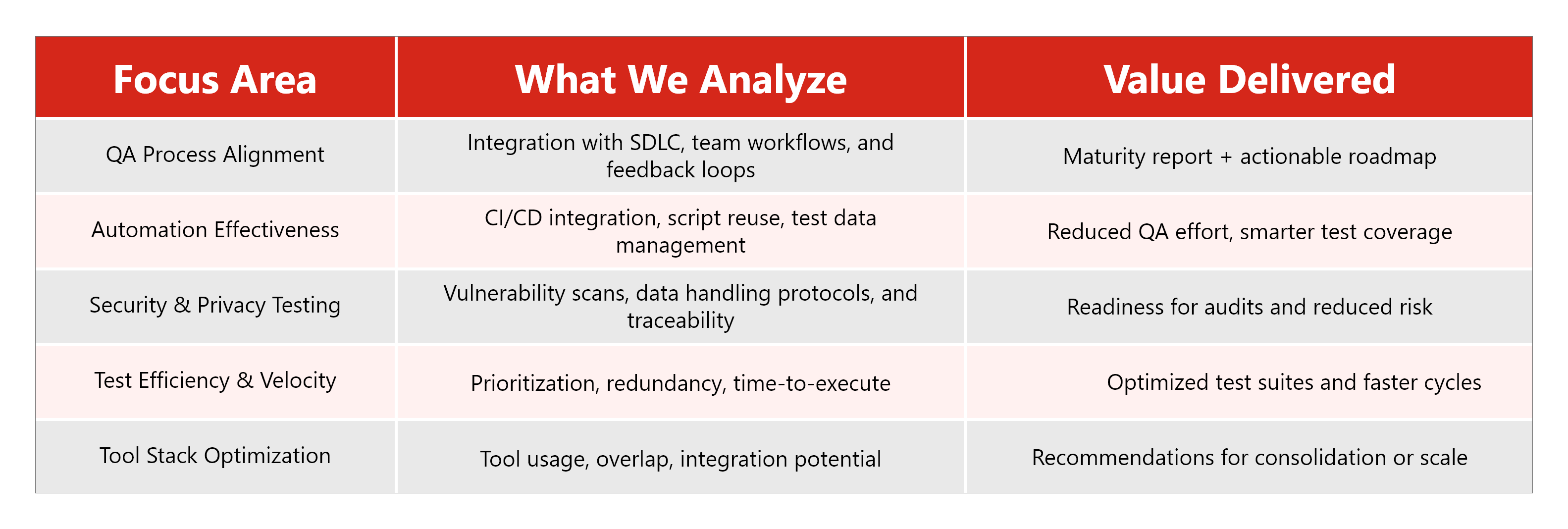Reengineering Quality: Why Your Quality Assurance Process Needs a Strategic Assessment
In an age where software drives every touchpoint—whether it’s a mission-critical enterprise tool or a consumer-facing app—the margin for error is shrinking, fast.
Despite investments in automation, DevOps, and cloud-native tooling, quality issues remain a persistent drag on delivery velocity and brand trust. Why? Because many organizations treat quality assurance (QA) as a tactical checkpoint, not a strategic capability.
If your QA still lives downstream—executing test cases, chasing bugs, and “signing off” on releases—you’re likely bleeding time, value, and confidence. The solution? A modern, objective QA Maturity Assessment that doesn’t just score your current practices but reshapes your ability to scale, secure, and ship software with confidence.
QA Isn’t Broken—It’s Just Misaligned
For most enterprises, QA isn’t underfunded. It’s misaligned.
Testers operate with incomplete specs. Automation exists, but only for regression. Performance tests are last-minute. Security testing is handled… elsewhere. These aren’t just process gaps—they’re organizational blind spots that erode delivery and decision-making.
A QA Assessment reframes the conversation:
From “Are we testing enough?” to “Are we building quality into everything we do?”
This shift helps teams go from:
- Repetitive manual execution ➝ Adaptive, intelligent automation
- Post-facto test planning ➝ Continuous quality embedded into CI/CD
- Isolated test tools ➝ Unified, metrics-driven engineering workflows
Common Roadblocks That Undermine QA Effectiveness
Even mature organizations fall into these traps, often unknowingly. A strategic QA Assessment helps surface and address these friction points:
Roadblock | What It Looks Like |
Siloed QA Practices | Testing happens downstream, disconnected from planning and design |
Outdated or Redundant Test Suites | Growing test libraries with low ROI and excessive maintenance overhead |
Inconsistent QA Ownership Across Teams | Ambiguity in who’s responsible for quality at each stage of SDLC |
Tool Fragmentation and Overlap | Teams use multiple unintegrated tools, creating insight gaps and wasted effort |
Manual Overload | Overreliance on manual testing even for repetitive, automatable tasks |
Lack of Metrics and Visibility | No clear KPIs, no dashboards, no way to measure whether QA is improving or degrading |
No Built-In Security Checks | Security validation is outsourced or postponed until late in the cycle |
What a Strategic QA Assessment Delivers
At iLink Digital, we approach QA assessments not as audits, but as enablers of transformation. Our framework evaluates your QA practice through five distinct, value-driven lenses:
- Process Maturity
We examine how QA aligns with your software development lifecycle (SDLC). Is it a siloed step or a continuous presence from planning to release? We look at roles, responsibilities, feedback loops, and real-world adherence to “shift-left” principles.
- Automation Health
Automation is often overestimated. Many teams automate what’s easy, not what’s impactful. We assess the depth of automation, coverage across layers (UI, API, unit), integration into pipelines, and the potential for AI/ML to enhance test efficiency.
- Security & Compliance Readiness
In today’s threat landscape, QA must be the first line of defense. We evaluate whether security and privacy checks are integrated into test cycles, how vulnerabilities are tracked, and how compliance requirements (e.g., GDPR, HIPAA) are operationalized.
- Standardization & Tooling
Are your teams reusing proven assets—or reinventing test cases every sprint? Do tools talk to each other—or work in silos? Standardization reduces QA debt, improves onboarding, and amplifies coverage. Tool sprawl, on the other hand, fragments insight.
- Actionable Analytics
We don’t just diagnose—we deliver context-rich reporting. From maturity scoring to test debt maps and ROI models, our reports drive executive alignment and engineering accountability.
Our complimentary one-week QA Assessment is designed to uncover the invisible blockers slowing down your quality strategy—no disruption required.
What You Gain from a Complimentary QA Assessment

The iLink Difference: Why Enterprises Trust Us
Our QA assessments are not off-the-shelf templates. They are informed by two decades of engineering delivery, over 250 enterprise engagements, and deep specialization across various sectors, including finance, healthcare, telecom, manufacturing, and beyond.
What makes us different?
- Engineering-Led Thinking
We bring an engineering-first mindset, deeply rooted in DevOps, agile delivery, cloud-native development, and enterprise-grade scalability.
- Security by Design
We embed ethical security, data privacy controls, and regulatory compliance as core assessment criteria, not afterthoughts.
- Smart Automation Recommendations
We don’t just recommend more automation—we recommend the right automation, including AI-powered test selection, synthetic data generation, and CI-based validations.
- Strategic Roadmaps, Not Just Reports
Every recommendation is prioritized, phased, and business-aligned, ensuring your teams know what to do next, not just what went wrong.
Thought to Take with You: QA Is a Business Discipline, not a Testing Role
In high-performing engineering cultures, QA isn’t seen as a department. It’s seen as a discipline embedded across the lifecycle—from architecture and design, through deployment and monitoring.
This mindset requires visibility, clarity, and accountability. That’s what a maturity assessment delivers.
It’s not just about finding bugs—it’s about building confidence into every release.
Let’s Build Quality Confidence—Together
Whether you’re scaling agile delivery, modernizing legacy systems, integrating AI into your workflows, or preparing for a compliance audit, you can’t afford to leave quality to chance.
A strategic QA Assessment from iLink gives you the clarity to act, the insights to improve, and the roadmap to elevate your QA function from reactive to resilient. Let us show you where you stand—and how to evolve. Book your complimentary QA Process Assessment today.


